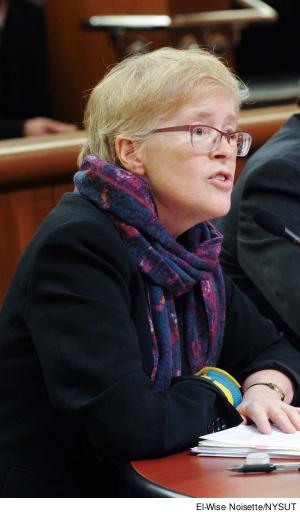Response to Cuomo’s budget
 |
The PSC’s verdict on Governor Andrew Cuomo’s budget proposal for CUNY is in: It’s a start, but it’s not enough to recover from years of underfunding.
PSC President Barbara Bowen and other higher education union leaders spoke about the budget proposal before a joint hearing of the State Senate Finance Committee and the Assembly Ways and Means Committee on January 24.
Bowen unveiled the union’s proposed four-year investment plan, one that would avoid putting the burden on tuition increases. In the first year of that plan, she said, Albany should move toward full funding with an additional $298 million, which would add $80 million to hire 1,000 new full-time faculty members and add $40 million to increase adjunct wages to $7,000 a course in five years.
Bowen laid out sobering statistical truths about the historic underfunding of CUNY, such as how full-time enrollment at senior colleges increased by 10 percent from 2008 to 2015, but in that same time period, per-student funding from the state fell 17 percent, when adjusted for inflation. Full-time enrollment increased 23 percent at community colleges over the same period, with a 5-percent drop in per-student state funding, when adjusted for inflation.
NUMBERS GAME
The governor’s plan calls for a $30 million increase for senior colleges, a part of a proposed $2.5 billion in state support for CUNY, according to the Wall Street Journal. Cuomo also unveiled a new scholarship plan (see story below) in January.
“The executive budget shows a nominal increase of $107 million in operating support over the last fiscal year. We appreciate the appropriation of $36.2 million to cover increased fringe benefits costs in the University’s operating budget and $456.6 million in capital funding, including double the funds for critical maintenance approved last year,” Bowen said in prepared testimony. “Otherwise, however, the state’s public investment in CUNY’s operating budget remains essentially flat with no other increase to the senior colleges, graduate school and University programs except for added revenue from a proposed tuition increase. There is an addition of $7.1 million due to higher enrollments at the community colleges, but there is no increase to community college base aid. Base aid remains at $2,697 per [full-time equivalent] student.”
“The University’s budget request includes a proposal for New York City to provide $10 million to offset the cost of the [Tuition Assistance Program, or] TAP tuition waiver credits and close the TAP gap,” she said. “The PSC supports this call for more support from the city and urges the State Legislature to provide $41 million in funding to close the remainder of the gap.”
CUNY’S VIEW
Chancellor James B. Milliken offered a competing three-year plan that he said would add full-time faculty and advisor positions. “By 2021, the chancellor aims to double the three-year graduation rate for students pursuing associate degrees, which is now about 18 percent,” the Wall Street Journal reported. “By 2024, Milliken wants to raise by 10 percentage points the six-year graduation rate for bachelor’s programs, now about 55 percent.”
The Young Invincibles, a partner in the CUNY Rising coalition, denounced the underfunding on CUNY in prepared remarks.
“Governor Cuomo’s FY18 Executive Budget Proposal proposes five more years of annual $250 tuition hikes and does not increase TAP awards. The legislature should reject the proposed tuition hikes, increase the maximum TAP award to $6,500 and index it to tuition so when tuition increases, so do TAP awards for all students,” the group said. During the academic year of 2015, the average TAP award for CUNY students at senior colleges was $1,947.68, accounting for only 30 percent of tuition costs, currently at $6,330. Unfortunately, because the erosion of state support to public higher education has caused tuition to skyrocket, cost is quickly outpacing TAP awards. The average award is worth significantly less than it was only a decade ago.”

